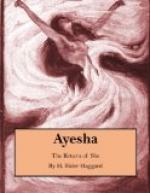Oh! she was—nay, I will not describe her. I knew her at once, for thus had I seen her last before the Fire of Life, and, strangely enough, through the mask of unutterable age, through that cloak of humanity’s last decay, still shone some resemblance to the glorious and superhuman Ayesha: the shape of the face, the air of defiant pride that for an instant bore her up—I know not what.
Yes, there she stood, and the fierce light of the heartless fires beat upon her, revealing every shame.
There was a dreadful silence. I saw Leo’s lips turn white and his knees begin to give; but by some effort he recovered himself, and stayed still and upright like a dead man held by a wire. Also I saw Atene—and this is to her credit—turn her head away. She had desired to see her rival humiliated, but that horrible sight shocked her; some sense of their common womanhood for the moment touched her pity. Only Simbri, who, I think, knew what to expect, and Oros remained quite unmoved; indeed, in that ghastly silence the latter spoke, and ever afterwards I loved him for his words.
“What of the vile vessel, rotted in the grave of time? What of the flesh that perishes?” he said. “Look through the ruined lamp to the eternal light which burns within. Look through its covering carrion to the inextinguishable soul.”
My heart applauded these noble sentiments. I was of one mind with Oros, but oh, Heaven! I felt that my brain was going, and I wished that it would go, so that I might hear and see no more.
That look which gathered on Ayesha’s mummy face? At first there had been a little hope, but the hope died, and anguish, anguish, anguish took its place.
Something must be done, this could not endure. My lips clave together, no word would come; my feet refused to move.
I began to contemplate the scenery. How wonderful were that sheet of flame, and the ripples which ran up and down its height. How awesome its billowy crest. It would be warm lying in yonder red gulf below with the dead Rassen, but oh! I wished that I shared his bed and had finished with these agonies.
Thank Heaven, Atene was speaking. She had stepped to the side of the naked-headed Thing, and stood by it in all the pride of her rich beauty and perfect womanhood.
“Leo Vincey, or Kallikrates,” said Atene, “take which name thou wilt; thou thinkest ill of me perhaps, but know that at least I scorn to mock a rival in her mortal shame. She told us a wild tale but now, a tale true or false, but more false than true, I think, of how I robbed a goddess of a votary, and of how that goddess—Ayesha’s self perchance—was avenged upon me for the crime of yielding to the man I loved. Well, let goddesses—if such indeed there be—take their way and work their will upon the helpless, and I, a mortal, will take mine until the clutch of doom closes round my throat and chokes out life and memory, and I too am a goddess—or a clod.




